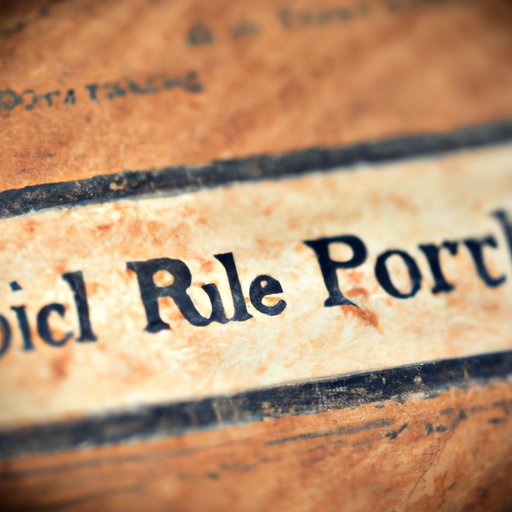Introduction
Dealing with the loss of a loved one is never easy, and it’s only made more difficult when you’re uncertain of their last wishes. Unfortunately, finding a will can be a time-consuming and expensive process. However, with a little know-how, you can find a will in public records for free. In this article, we’ll explore the steps necessary to access public records and find a will, along with tips and tricks for conducting a thorough search.
Understanding Public Records
Before we dive into the specifics of finding a will, it’s important to understand what public records are and how they can be accessed. Public records are documents that are available to the public by law, either online or in person. These records may be maintained by government agencies, courts, or other public institutions. In the case of wills, public records may be found in probate court records.
Probate court is responsible for handling the distribution of an individual’s assets after their death. When someone passes away, their estate goes through probate court so that any debts owed by the individual can be paid off and their assets can be properly distributed to their beneficiaries. This is where you can find a will – if one exists.
Step-by-Step Guide to Finding a Will in Public Records for Free
Now that we have a better grasp of what public records are and where to find a will, let’s dive into the step-by-step process of accessing public records.
Step 1: Identify the Probate Court
The first step is to locate the probate court where the will was filed. This may be in the county where the individual lived or had assets. A simple Google search for “[name of the county] probate court” can quickly provide you with the necessary information.
Step 2: Determine the County of Jurisdiction
Next, you’ll need to determine the county where the individual lived or had assets. This may require some additional research, particularly if the individual lived in multiple locations over their lifetime. If you have any documents that list the individual’s residence or assets, these can be helpful in narrowing down your search.
Step 3: Locate the Records Office
Once you have identified the county where the will was filed, you’ll need to locate the records office. This may be in the same building as the probate court or in a separate location. Again, a Google search can quickly provide you with the necessary information.
Step 4: Access the Docket
Once you have located the records office, you’ll need to access the docket. The docket contains a list of all the cases that have been filed with the court, including wills. You’ll want to look for the specific case number associated with the will, which can be found by searching for the individual’s name or date of death.
Step 5: Retrieve the Will
Finally, you’ll need to retrieve the will itself. This may require a formal request to the court, particularly if the will is not available online. You’ll want to contact the court clerk to find out the specific procedures for obtaining a copy of the will.
Tips and Tricks for Conducting a Thorough Search for Wills in Public Records
While the steps outlined above may seem straightforward, finding a will in public records can be a time-consuming process. To help make your search more efficient, consider utilizing the following tips and tricks:
Utilize Online Resources
Many probate courts now offer online access to their records, which can save you a trip to the courthouse. Some of these records may be free, while others may require a fee. Websites such as Ancestry.com and FamilySearch.org can also be helpful resources for finding wills and other probate records.
Network with Other Genealogists
Genealogy enthusiasts can be a wealth of information when it comes to accessing public records. Consider joining a local genealogy society or online forum to connect with others who have experience in this area. They may be able to provide you with additional resources or tips that you might not have considered.
Be Patient and Persistent
It’s important to remember that accessing public records can be a slow and frustrating process. Records may be incomplete, lost, or simply difficult to locate. However, don’t give up! Persistence can pay off in the end.
Keep Accurate Records
As you conduct your search, be sure to keep accurate records of where you have looked, what you have found, and any questions you may have for the court clerk. This will help you avoid duplicating your efforts and ensure that you have all the necessary information when it comes time to retrieve the will.
Conclusion
Locating a will in public records can be a daunting task, but with a little patience and persistence, it can be done. By following the steps outlined in this article and utilizing the tips and tricks provided, you can access public records for free and locate the will you’re searching for. Remember, this knowledge is not only helpful for your own genealogical research but can also be shared with others who may be searching for their own family history.
